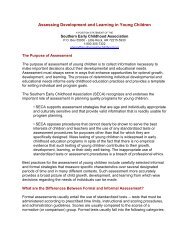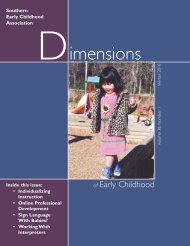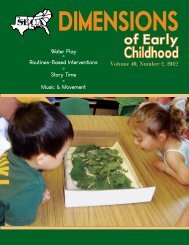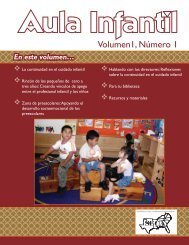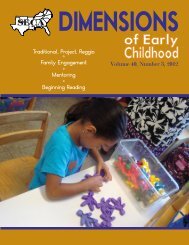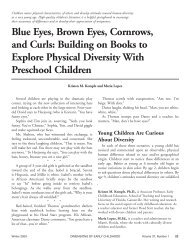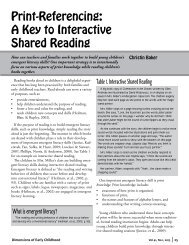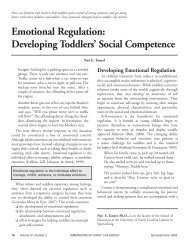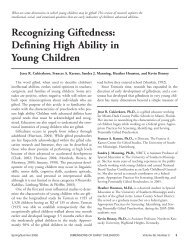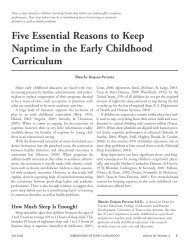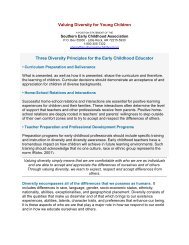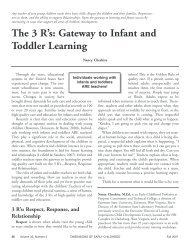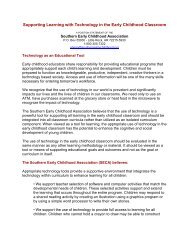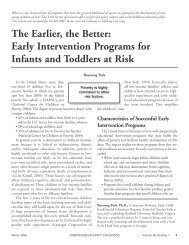Why Does Gender Matter? - Southern Early Childhood Association
Why Does Gender Matter? - Southern Early Childhood Association
Why Does Gender Matter? - Southern Early Childhood Association
You also want an ePaper? Increase the reach of your titles
YUMPU automatically turns print PDFs into web optimized ePapers that Google loves.
<strong>Why</strong> <strong>Does</strong> <strong>Gender</strong> <strong>Matter</strong>? Counteracting Stereotypes With Young Children<br />
in creative and language arts<br />
(Derman-Sparks, 2001).<br />
Skilled teachers encourage<br />
cross-gender activities and play in<br />
cross-gender centers. They can also<br />
positively reinforce children who are<br />
playing with non-stereotyped toys<br />
by talking with them and supporting<br />
their learning.<br />
Families<br />
<strong>Gender</strong> differentiation and identity<br />
construction begins at home,<br />
in that familial practices are often<br />
profoundly gendered in terms of<br />
relationships and roles (Morrow,<br />
2006). Teachers can help inform<br />
families of children by<br />
• demonstrating unbiased interactions<br />
and communication,<br />
and<br />
• providing coaching and<br />
encouragement, while<br />
• respecting cultural differences<br />
without judgment or<br />
condescension.<br />
Family workshops and information<br />
about the long-term effects of gender<br />
bias can also increase the awareness<br />
and critical thinking about ways that<br />
families communicate gender stereotypes<br />
to children (Small, 2003).<br />
Implications for<br />
Teacher Education<br />
Teachers play a critical role in promoting<br />
equitable learning. Findings<br />
from national surveys in the U.S.<br />
suggest that prospective teachers<br />
receive little or no teacher preparation<br />
about equity, perhaps due to<br />
competing requirements in limited<br />
time (Langford, 2006; Sadker, et<br />
al., 2007; Sandholtz & Sandholtz,<br />
2010). Consequently, new teachers<br />
are often unaware of how their<br />
behavior and the educational materials<br />
they use may hinder equitable<br />
learning in their classrooms.<br />
In addition, a common misconception<br />
of preservice teachers is<br />
that only students, not teachers, are<br />
responsible for bias in classroom interactions.<br />
Novice teachers may enter<br />
the profession without the skills to<br />
make changes in four key areas:<br />
• school curriculum,<br />
• interaction patterns,<br />
• pedagogical strategies, and<br />
• use of resources.<br />
Prepare teachers to<br />
promote equitable<br />
teaching.<br />
It is imperative to prepare novice<br />
teachers to recognize gender issues<br />
and promote equitable teaching<br />
(Fulmer, 2010). Teacher educators<br />
themselves must be committed<br />
to teaching students about gender<br />
issues. If only a few teacher educators<br />
in an institution address gender<br />
issues, preservice teachers receive<br />
mixed messages about their importance.<br />
The curriculum in highquality<br />
teacher education programs<br />
incorporates gender issues.<br />
Although making gender issues<br />
a required course may seem like a<br />
viable approach, Geist and King<br />
(2008) argue that it is problematic<br />
for three reasons:<br />
• few programs have available<br />
space;<br />
• a separate course may leave<br />
important gender dimensions<br />
out of educational foundations,<br />
methods courses, and<br />
field experience; and<br />
• the separation may suggest<br />
gender equity is a sidebar for<br />
students to the real work of<br />
education.<br />
The content of textbooks and<br />
instructional materials throughout<br />
teacher education courses is critical<br />
because of its potential to reduce or,<br />
through omission and stereotyping,<br />
reinforce biased attitudes and behaviors<br />
(Sadker, et al., 2007).<br />
Roles of Administrators<br />
Administrators are urged to<br />
establish an ongoing process of<br />
introspection and evaluation to help<br />
teachers consider how they relate<br />
to genders differently. Teachers can<br />
then monitor their language and<br />
actions in order to eliminate inadvertently<br />
biased messages.<br />
Administrators are also advised<br />
to consider the consequences of<br />
hiring an all-female staff. Program<br />
structure should also allow for the<br />
maintenance of group gender balance<br />
to facilitate opportunities for<br />
male/female interaction (Robeson,<br />
Marshall, & Keefe, 2003). Additionally,<br />
administrators can coordinate<br />
in-service opportunities for families<br />
and professional development in the<br />
areas of anti-bias curriculum and<br />
neutralizing gender stereotypes in<br />
young children.<br />
Conclusions<br />
The power of self-concept is profound,<br />
as is the ability of adults to<br />
influence the children around them.<br />
Families and teachers are encouraged<br />
to conscientiously and actively create<br />
a positive learning environment<br />
for young children—not just in<br />
promoting developmentally appropriate<br />
practices to stimulate cognitive,<br />
social, emotional, and physical<br />
Dimensions of <strong>Early</strong> <strong>Childhood</strong> Vol 39, No 3, 2011 17



